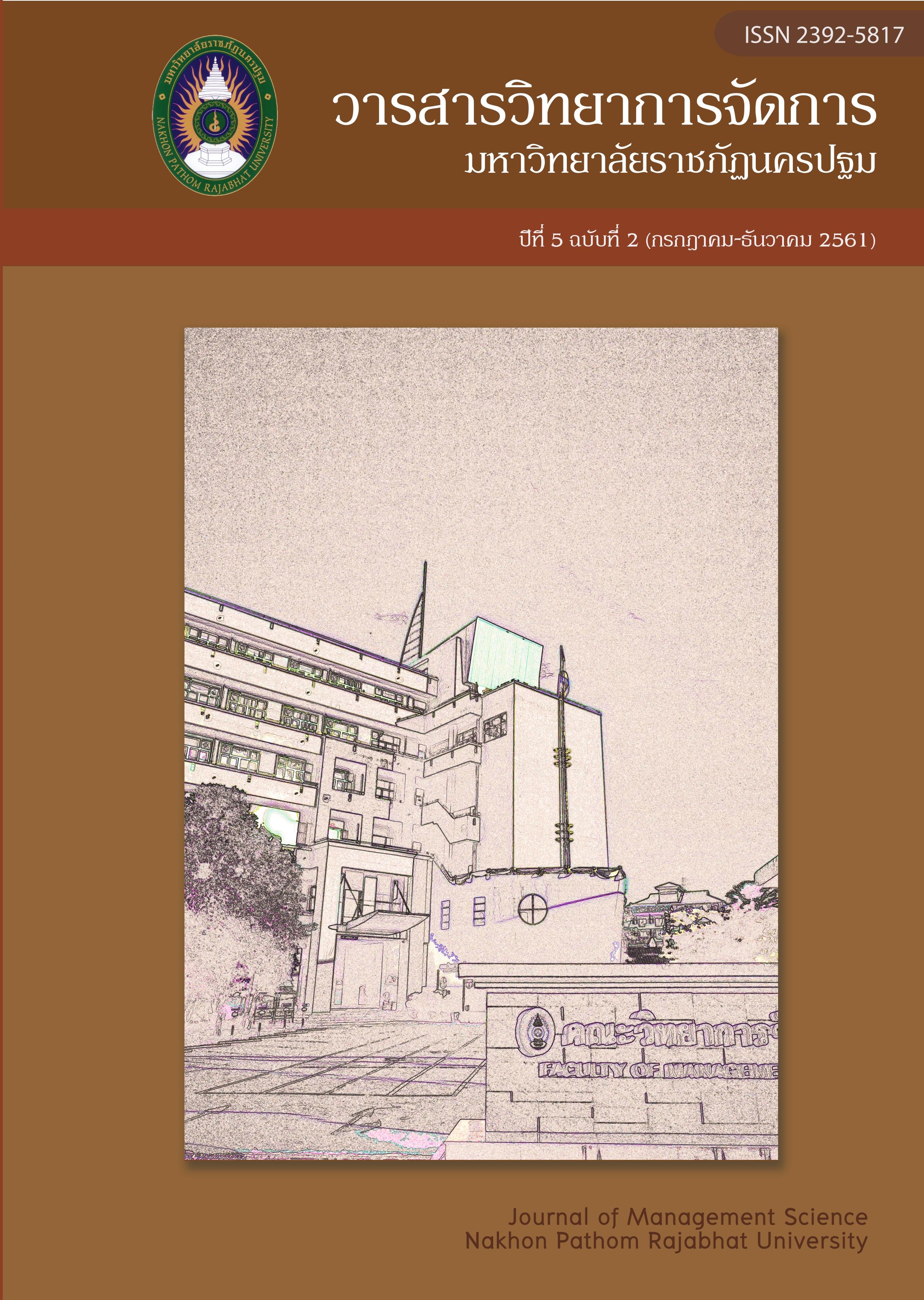Guidelines for learning and innovation skills development of Silpakorn university’s student follow Thailand 4.0 policy.
Main Article Content
Abstract
The objectives of the research are 1) to study the level of the learning and innovation skills 2) to compare the level of the learning and innovation skills consolidated by personal factors 3) to study the factors that affect the learning and innovation skills 4) to study the developmental guideline of the learning and innovation skills of the students of Silpakorn University according to Thailand 4.0 national policy. The sample is the fourth year of undergraduate students of the year 2560 of Silpakorn University in the total of 350 students, using random class and simple random as the sampling methods, and 5 in-depth interview participants. The research tools consist of the questionnaire and guided questions for the in-depth interview. The researcher analyzed data using the distribution of Frequency, Percentage, Arithmetic Mean, Standard Deviation, Independent Samples t-test, One-way ANOVA, and content analysis.
The research found that 1) the overall level of the learning and innovation skills of the students of Silpakorn University according to Thailand 4.0 national policy are ranked in high level 2) when comparing the learning and innovation skills of the students of Silpakorn University according to Thailand 4.0 national policy consolidated by personal factors found that only sex and cumulative grade point averages affect the learning and innovation skills of the students of Silpakorn University according to Thailand 4.0 national policy statistically significant at 0.05 3) Educational standards Curriculum and teaching methods affect learning and innovation skills. According to the policy of Thailand 4.0 at the significance level of 0.05 and can predict the learning and innovation skills of 33 percent, respectively 4) The development of learning and creative skills of Silpakorn University students according to the country policy 4.0 (4.1) Educational standards should be adjusted to meet the needs of the learners. Focus on teaching and learning by integrating knowledge and action. (4.2) Skill assessment there should be a variety of assessments. Focus on the evaluation of student work that has been created. (4.3) Curriculum and teaching methods There should be a change in teaching methods using the Project Based Teaching Methodology in order to create students' creativity and learning process. (4.4) Professional Development It should be developed in terms of understanding the direction of student skills development to keep up with the modern age. (4.5) Learning environment the classroom environment should be improved to suit the learning needs.
Article history : Received 2 May 2018
Revised 2 August 2018
Accepted 10 August 2018
SIMILARITY INDEX = 0.00
Article Details
The views and opinions of the article appearing in this journal are those of the author. It is not considered a view and responsibility of the editorial staff.
References
กมลชนก กําเนิดนก.(2551). การพัฒนาศักยภาพตนเองของนิสิตมหาวิทยาลัยนเรศวร. รายงานการวิจัย. กองกิจการนิสิต.มหาวิทยาลัยนเรศวร.
กองบริหารงานวิจัยและประกันคุณภาพการศึกษา. (2559). พิมพ์เขียว Thailand 4.0 โมเดลขับเคลื่อนประเทศไทยสู่ความมั่งคั่ง มั่นคงและยั่งยืน. กรุงเทพฯ: กองบริหารงานวิจัยและประกันคุณภาพการศึกษา.
กองบริการการศึกษา มหาวิทยาลัยศิลปากร. (2561). สถิตินักศึกษามหาวิทยาลัยศิลปากร. เข้าถึงเมื่อ 24 มีนาคม 2561. https://reg3.su.ac.th/registrar/stat_studententry.asp?avs22185792=1.
ธนวัฒน์ อรุณสุขสว่าง. (2558). ปัจจัยที่ส่งผลต่อความสามารถในการใช้ภาษาอังกฤษตามทักษะการเรียนรู้ในศตวรรษที่ 21 ของนักเรียนมัธยมศึกษาปีที่ 6 เขตพื้นที่การศึกษามัธยมศึกษา กรุงเทพมหานคร เขต2 เพื่อรองรับการเข้าสู่ประชาคมอาเซียน. Veridian E-Journal, Silpakorn University . 8 (2): 493-505.
นพพร จันทรนำชู. (2561). แนวทางการพัฒนาทักษะวิชาชีพของนักศึกษาสถาบันการอาชีวศึกษาภาคกลาง 4 เพื่อการพัฒนาทรัพยากรมนุษย์สู่ประเทศไทย 4.0. รายงานวิจัยคณะศึกษาศาสตร์. มหาวิทยาลัยศิลปากร.
บุษกร จินต์ธนาวัฒน์. (2558). แนวทางการเตรียมความพร้อมในการประกอบอาชีพของนักศึกษามหาวิทยาลัยศิลปากร เพื่อรองรับการเข้าสู่ประชาคมเศรษฐกิจอาเซียน. วิทยานิพนธ์บริหารธุรกิจมหาบัณฑิต. มหาวิทยาลัยราชภัฏนครปฐม.
มหาวิทยาลัยเทคโนโลยีพระจอมเกล้าพระนครเหนือ. (2557). ข่าวประกันคุณภาพการศึกษามหาวิทยาลัยเทคโนโลยีพระจอมเกล้าพระนครเหนือ. ฉบับที่ 303. [ออนไลน์]. ค้นเมื่อ 19 มกราคม 2560. จาก https://www.qa.kmutnb.ac.th/qa_news/2557/QANEWS303_25570101.pdf.
สุนีย์ ชัยสุขสังข์. (2554). กลยุทธ์การบริหารวิชาการเพื่อเสริมสร้างทักษะแห่งศตวรรษที่ 21 ของนักเรียนในโรงเรียนเอกชนทางเลือก. วิทยานิพนธ์ปริญญาครุศาสตรดุษฎีบัณฑิต. สาขาวิชาบริหารการศึกษา. จุฬาลงกรณ์มหาวิทยาลัย.
สถาบันวิจัยเพื่อการพัฒนาประเทศไทย. (2557). การจัดทำยุทธศาสตร์การปฏิรูปการศึกษาขั้นพื้นฐานให้เกิดความรับผิดชอบ. รายงานทีดีอาร์ไอ. ฉบับที่ 103(เดือนพฤษภาคม). 11.
Aichouni M., Touahmia M, Al-Ghamdi A., N.Ait-Messaoudene, R.M.Al-Hamali, A.Al-Ghonamy, and Al-Badawi.E. (2015). Creativity and Innovation among Gifted Saudi Students-An Empirical Study. Procedia - Social and Behavioral Sciences, 195 (3): 1371-1379.
Cronbach, L.J.(1974). Essentials of Psychological Testing. (3rd ed.) New York : Harper and Row.
Gundry,L.K and Kickul,J.R. (2014). Seeing around corners: How creativity skills in entrepreneurship education influence innovation in business. The International Journal of Management Education, 12 (11) : 529-538.
Livotov, P. (2015). Measuring Motivation and Innovation Skills in Advanced Course in New Product Development and Inventive Problem Solving with TRIZ for Mechanical Engineering Students. Procedia Engineering, 131 : 767-775.
Meijukeinanen, and Nissinen,K. (2018). How to measure students’ innovation competences in higher education: Evaluation of an assessment tool in authentic learning environments. Studies in Educational Evaluation. 58 (11) : 30-36.
Orit Avidov-Unger and Alona Forkosh-Baruuch. (2018). Professional identity of teacher educators in the digital era in light of demands of pedagogical innovation. Teaching and Teacher Education. 73 (6) : 183-191.
The Partnership for 21st century Learning (2017). Framework for 21st Century Learning. Retrieved 20 May 2017, from, https://www.p21.org/our-work/p21-framework.


